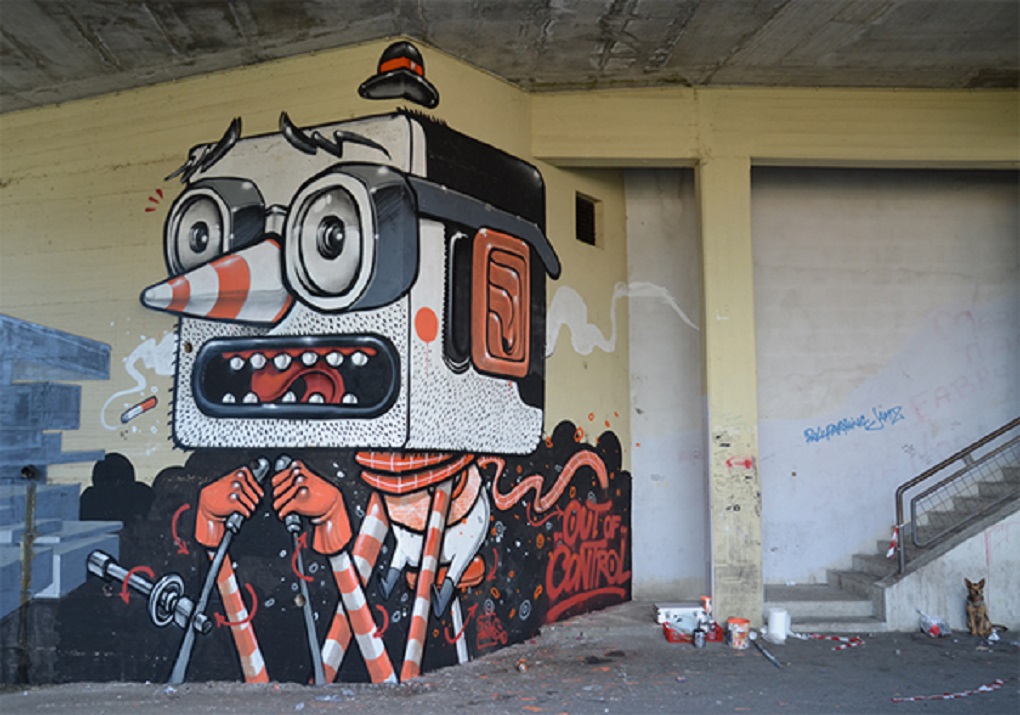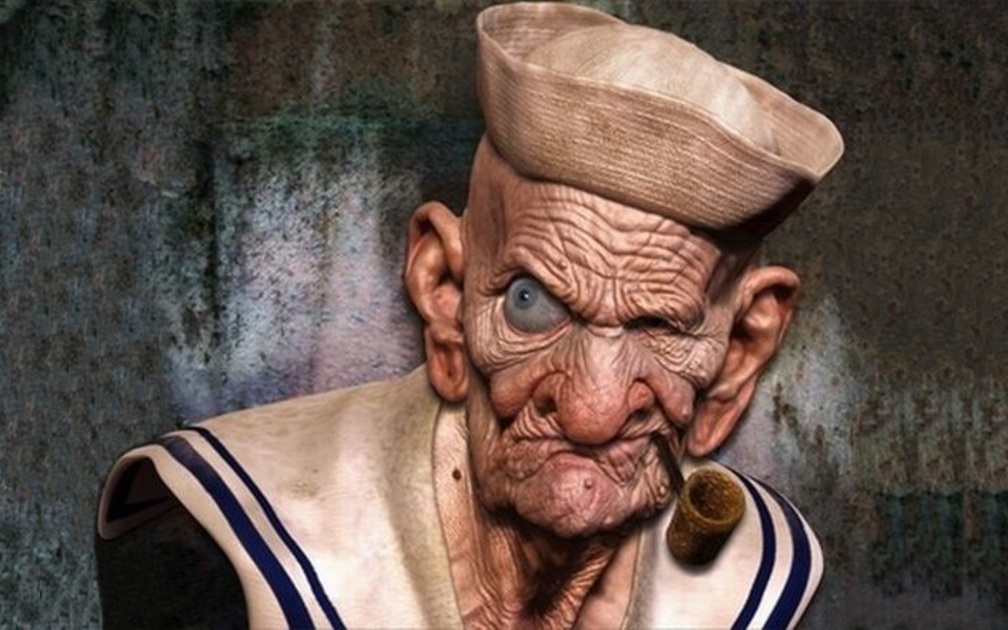We can’t really take ownership of what we refer to as ‘our’ lives, and when we try to (when we think that we can take ownership) then we create suffering. The idea that we have ownership of ‘our own lives’ is such a fundamental idea that it is almost impossible for us to question it. Even when we say ‘we can’t take ownership of our own lives’ we are assuming ownership, and so we have fallen into the trap even by coming out with that. The core idea that this is ‘my’ life is both ridiculously ‘self-evident’ to me and completely erroneous at the same time, and what this means is that I am extremely unlikely ever to see through to the root of the suffering that I have created! The suffering is however our way of learning that we can’t take ownership of life and so at the same time as being the result of our wrongly assumed ownership of what’s going on with us, the suffering is also the way in which that ‘mistake’ (if we may call it that) gets ‘corrected’….
What happens when we take ownership of what’s going on with us is that we get to feel good and bad in equal amounts. ‘Congratulations and condolences’ say the ancient alchemists, in their gnomic fashion. We feel good when things go the way we think they should do because we take personal credit for it, and we feel bad when things don’t go according to plan for exactly the same reason. On the one hand we feel pride, and on the other hand we feel humiliation. On the one hand we get to feel the heady euphoria of triumph, and on the other hand we get to drink deep of the bitter wine of despair. The intoxicating euphoria of victory and the bitter pain of despair and defeat that comes with failure might seem like entirely different things, but they’re not. They come from the same source.
Both the euphoria of winning and the dysphoria of losing come from the very same source and that source is us assuming ownership of our own actions and our own thoughts. We assume ourselves to be ‘the one who does it’ and this is an assumption that hardly anyone will ever disagree with! We assume ourselves to be the agent, the actual author all our actions. This may seem to be a perfectly logical or reasonable assumption to make but the point is – as we have said – that there are consequences that have to be reckoned with further down the line. As one Indian teacher has it, when I see these thoughts as my thoughts then thought-karma is created, when I see these actions as my actions then action-karma is created, when I see this body as my body then body-karma is created. When I see this toe as my toe, then toe-karma is created…. Karma Yoga (which is where we practice non-attachment to the fruit of our actions) is thus a path of avoiding producing this self-orientated karma. When we practice Karma Yoga we don’t renounce ‘worldly life’ and try to be more spiritual (which would be the action of the calculating ego-self) but rather we cultivate indifference to the fruits of our actions (i.e. we stop being so obsessively fixated on ‘succeeding’ the whole time).
Karma isn’t what we in the West think it is, therefore. It’s not really true that when we perform meritorious actions then we receive ‘good ‘karma’, and when we behave selfishly and ignobly then we reap ‘bad karma’ instead. That’s a very ‘self-orientated’ way of looking at things! Anything the self does or thinks creates karma and that karma is suffering. Anything the self does creates ‘self-karma’ – the karma of thinking that one is this self! Any actions that I see as ‘mine’ are going to creates karma because these are actions that are based on delusion (or erroneous understandings) and karma is equally pleasure and pain.
The point about karma is that it always balances itself out – it always includes euphoria and dysphoria in equal portions. The fact that karma (i.e. the consequences of thinking that we are this concrete and separate self when we aren’t) is telling us a very clear message; it’s providing us with a kind of an ‘error-signal’, if only we could recognize it. What the perfect balancing of pleasure and pain is telling us is that it is a meaningless thing to ‘take ownership for our lives’ (i.e. ‘assume authorship of our thoughts and actions’) in the way that we do. Because this is a meaningless thing (a null-action) the results of it are always going to cancel themselves out…
Our perennial hope is that one day the scales won’t balance themselves out, that one day we will get the euphoria of winning without incurring a corresponding ‘debt of despair’ that sooner or later we have to pay off. We hope to get the plus without the minus, the upside without the downside, the pay-off without the pay-back. This is the hope that keeps us going, the hope that we never let go of. This hope – utterly unwarranted as it is – truly does ‘spring eternal to the human breast’!
What we’re really hoping of course is that it’ll somehow turn out that there actually is someone there to take ownership of what’s going on, someone who can legitimately claim authorship for it. In our ‘unconscious reasoning’ – which we are at pain never to look at because it doesn’t actually make sense – we equating getting a plus without a minus (or an upside without a downside) with proving that we’re really here! As Gregory Tucker says, proving this (proving that we here rather than just ‘dreaming that we’re here) is always the ultimate agenda of the dreamer who wants to believe in the dream. What other agenda could it have, after all? This is what Gregory Tucker calls The Master Lie – i.e. what it takes in this dream to prove that the dream isn’t a dream. We’re hoping that it will turn out that there really is a dreamer, and this is we are so determined to believe in the dream, no matter how painful or restrictive or repetitive that dream might be…
We never get tired of hoping that it will turn out to be the case that there actually is ‘an agent’ (or ‘an actor/author’) behind the life that we see unfolding around the relative viewpoint that we see as being ‘us’, even though we will never own up to the fact that this is what we’re hoping for. If we owned up to hoping to find out that we actually exist as the actor or agent or author then this would be the very same thing as owning up to the fear that perhaps there isn’t, and this would never do! Instead of saying that we are trying to prove that we exist therefore we say that we are striving to be winners rather than losers, successful rather than unsuccessful, and this sounds much better to us. We can ‘hope to win’ without owning to the fact that winning is a secret code word for ‘actually existing’!
This then is what all our tiresome talk of ‘success’ comes down to; this is why we never get tired off waffling on foolishly about ‘succeeding’ and ‘winning’ in the way that we do. It’s because we are secretly hoping that there is someone there who can be successful – we focus narrowly (and stupidly) on the goal that is to be attained and furtively hope at the same time that this stratagem will produce a self. We fixate obsessively upon the goal that is supposedly so great and so wonderful because this way we never have to look into the vexed question of whether there actually is anyone there to attain that goal; by being compulsively goal-orientated in the way that we are hoping to bury that particular thorny issue.
There is a ‘self-construct’, an ‘ego-assembly’, but no one owns it – it’s entirely hollow, entirely lacking in any interior territory. It’s fine if we see that the self-construct is hollow and lacking in interiority and that it doesn’t belong to anyone. It’s fine if we see that the ego-assembly doesn’t have an owner – no karma, no suffering is created then. We’re not doing everything for the sake of someone who doesn’t exist! But then again even if we DON’T see that the self-construct doesn’t actually have an owner this is fine too. This too is perfectly OK, perfectly unproblematic. We CAN take ownership of what’s going on, we CAN assume authorship and feel pride or humiliation with regard to our actions and how we or others judge them, and this is a perfectly legitimate path to go down. We’re creating suffering, we’re creating karma, but this isn’t a problem – even if we think it is. It’s just another way of doing the same thing, so to speak…
It isn’t a problem when we go down this path because the suffering that we’re creating is simply our way of learning that there’s no one there to take ownership of anything, or claim authorship of our thoughts and actions. The suffering that we are incurring is our way of learning something that we don’t want to learn – if we did want to learn it then it wouldn’t be suffering! We don’t want to understand the message that we keep on getting and this is what drags the whole business of ‘learning’ out so long – we are indefinitely postponing the moment when we see our illusions to be illusions and that’s OK too. We can postpone getting the message for as long as we like but we’ll get it in the end because that’s the nature of the process we’re involved in. We’re escaping but the escaping isn’t real; we’re playing the part of the Artful Dodger but the Artful Dodger’s gonna get caught… We can postpone the moment for as long as we please and it doesn’t make any difference because our postponement exists in linear time and linear time doesn’t exist! We create linear time with our wilful ignoring of reality (or as we could also say, we create what Krishnamurti calls psychological time with our denial) and we’re free to do so. We’re free not to face the truth for as long as we want to but we’ll face it in the end because nothing else exists but the truth! All illusions are destined to be destroyed…
Art: Sebastian Onufszak







Rashid Dossett
What it comes down to is that worldly people in general HATE and are ANATHEMA towards true happiness. The only ‘happiness’ worldly people are interested in (and even obsessed about) is the relief seeking self-validation that society offers them – which is a sterile, self-cancelling bondage that worldlings (as I call them) REFUSE to see for what it is.
This sounds quite strange and even disturbing – it is, however, what it is. Only a small minority of the human population seem diligent enough to escape this collective null movement.
Be of good cheer if you are one of those!
Nick Williams
It is a very interesting thought that there is a global conspiracy against anyone ever being happy. ‘Interesting’ is too dispassionate a word actually, I know. But this is an incredible thing to realize – that there’s a plot against happiness. It’s a plot or conspiracy because no one will admit it!